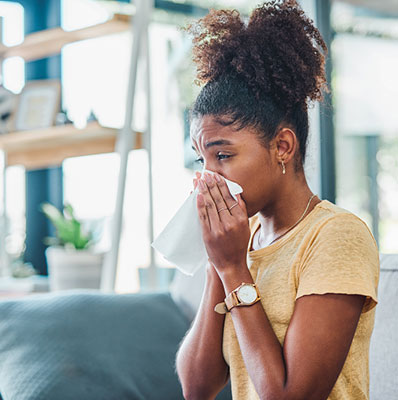Have Allergies? 6 Signs You Should See a Doctor

September 21, 2021
For the millions of people who suffer from seasonal allergies, spring may mean constant sneezing, watery eyes and itchiness on the roof of the mouth. If you’ve come to expect these symptoms when pollen goes airborne each year, you may get through the so-called “hay fever” season by popping over-the-counter allergy pills and trying to stay indoors. But if you’ve grown tired of this routine, or if it isn’t sufficient, perhaps you’ve been wondering if seeing a doctor could help to ease some of your discomfort.
How can you tell if you should see a doctor or if you should continue to manage your condition by yourself? Vijay Halari, M.D., a family medicine doctor with Hackensack Meridian Health Medical Group in Brick shared some signs that you should consider discussing seasonal allergies with a doctor:
- Your symptoms have gotten worse. If you’ve had allergies for years, your symptoms may have gradually worsened over time without you realizing it. Think back five or 10 years. Was allergy season always this bad?
- There are complications. Do your seasonal allergies often cause sinus infections or make it hard for you to breathe?
- You also have asthma. If you think that you’re developing seasonal allergies and you’ve already been diagnosed with asthma, see your doctor. Having allergies may make it harder for you to breathe or manage your asthma. Specialists who treat asthma often treat allergies, as well.
- It feels like forever. Have you been congested, sneezing and/or wheezing for weeks on end, or across multiple seasons? Seasonal allergies typically last longer than a cold, but you may want to talk to a doctor if your symptoms are lingering longer than expected.
- Your quality of life is affected. Do you need to be outdoors for work, or do you typically choose to spend a lot of your free time outdoors? If you aren’t willing or able to be cooped up indoors for weeks on end, an allergist may be able to offer you workable solutions.
- Over-the-counter (OTC) medicine doesn’t help. For some people, OTC medicine doesn’t offer enough relief from allergy symptoms. Other people may not be able to function well at work while under the influence of OTC medication, if they experience side effects like drowsiness.
How doctors can help to ease allergy symptoms
An allergist can diagnose a seasonal pollen allergy with a blood test or skin-prick test. A variety of treatments are available, including:
- prescription medications
- allergy shots (immunotherapy), which may help to eliminate symptoms over time
- sublingual immunotherapy, a symptom-reducing medication that’s placed under the tongue
Additionally, your allergist may ask you about your personal lifestyle and recommend changes like these to help minimize seasonal allergy symptoms:
- keeping your windows closed during pollen season, to prevent pollen from getting inside
- changing out of your clothing when you come indoors, to keep pollen off of your furniture
- showering and washing your hair before getting into bed, to keep pollen off of your sheets
- using a clothes dryer, rather than an outdoor clothesline, to keep pollen off of clean clothing
Next Steps & Resources:
- Meet our source: Vijay Halari, M.D.
- To make an appointment with Dr. Halari or a doctor near you, call 800-822-8905 or visit our website.
The material provided through HealthU is intended to be used as general information only and should not replace the advice of your physician. Always consult your physician for individual care.






